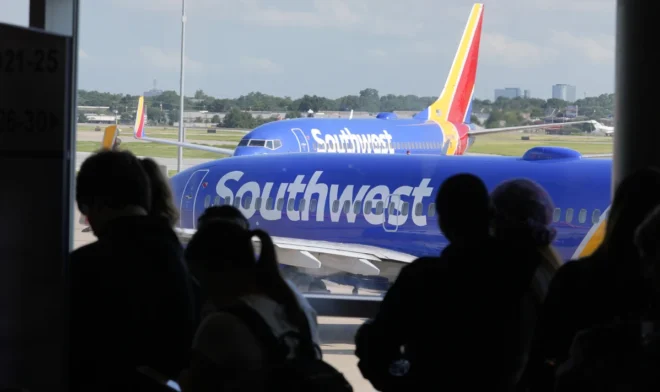
Southwest Airlines, renowned for its distinctive open seating policy, is set to revolutionize its boarding process by introducing assigned seats. This major shift in policy marks a significant departure from a tradition that has been a cornerstone of the airline’s identity for nearly 50 years. The change, while surprising to many, aims to enhance passenger experience and streamline operations. In this article, we will delve into the reasons behind this decision, the expected impact on travelers, and the broader implications for the airline industry.
A Look Back at Southwest’s Open Seating Policy
Since its inception in 1971, Southwest Airlines has set itself apart from competitors through its unique open seating policy. Unlike other airlines that assigned seats at booking, Southwest allowed passengers to choose their seats upon boarding, making for a more dynamic and flexible boarding experience. This policy was a hallmark of the airline’s brand, reflecting its commitment to providing a casual and customer-centric flying experience.
The open seating approach was intended to simplify boarding and reduce operational costs. By avoiding the complexities of seat assignments, Southwest could keep ticket prices lower and focus on efficiency. This system also encouraged a sense of camaraderie among passengers, who would often engage in friendly interactions while finding their seats.
The Rationale for Change
Despite the advantages, the open seating policy has faced growing criticism and challenges over the years. As passenger expectations and airline competition have evolved, the drawbacks of open seating have become more pronounced. Several factors have driven Southwest to reconsider its approach:
1. Increased Demand for Assigned Seating: In recent years, travelers have increasingly expressed a preference for assigned seats. The desire for certainty and comfort has led many passengers to favor airlines that provide seat assignments as part of their booking process. With more airlines adopting assigned seating, Southwest’s policy began to appear outdated in comparison.
2. Operational Efficiency: While open seating was initially efficient, it has become increasingly cumbersome with larger aircraft and more passengers. The boarding process can be chaotic, leading to longer wait times and increased stress for both passengers and crew. Assigned seating is expected to streamline boarding, reduce delays, and improve overall efficiency.
3. Revenue Generation: Assigned seating allows airlines to introduce premium seating options and charge extra for preferred seats. This revenue model has proven successful for many carriers and is a compelling incentive for Southwest to make the shift. By offering a range of seating options, Southwest can enhance its revenue streams while meeting diverse passenger needs.
4. Passenger Experience: Comfort and convenience are top priorities for modern travelers. Assigned seating offers passengers the assurance of a guaranteed seat and the ability to choose their preferred location in advance. This change aligns with Southwest’s commitment to improving passenger satisfaction and providing a more personalized flying experience.
What to Expect with the New Policy
Southwest Airlines has outlined several key aspects of the new assigned seating policy, which will be implemented over the coming months. Here’s what passengers can anticipate:
1. Seat Selection at Booking: Passengers will have the option to select their seats when booking their tickets. This change will allow travelers to choose seats based on their preferences, such as proximity to the aisle or window, and avoid the uncertainty of the open seating system.
2. Boarding Process: The boarding process will be streamlined with the introduction of assigned seating. Passengers will board according to their assigned group, reducing the need for passengers to rush or jostle for seats. This organized approach is expected to lead to a smoother and more efficient boarding experience.
3. Seat Upgrades and Changes: Southwest will offer opportunities for passengers to upgrade their seats or change their seat assignments for an additional fee. This flexibility will cater to travelers seeking more comfort or specific seating arrangements, enhancing their overall travel experience.
4. Continued Focus on Affordability: Despite the shift to assigned seating, Southwest remains committed to maintaining its reputation for affordable fares. The airline will continue to offer competitive pricing while introducing additional services and options to enhance passenger satisfaction.
Industry Implications
Southwest’s move to assigned seating could have significant implications for the airline industry as a whole. The shift may prompt other carriers to reevaluate their seating policies and consider adopting similar changes. The industry’s focus on enhancing passenger experience and operational efficiency may lead to further innovations and adaptations in seating arrangements.
Additionally, the transition could influence how airlines structure their pricing and service offerings. With assigned seating becoming more prevalent, passengers may increasingly expect seat selection as a standard feature, and airlines may need to adjust their pricing models accordingly.
Reactions and Feedback
The announcement of Southwest’s new policy has garnered mixed reactions from travelers and industry experts. Some passengers are excited about the prospect of assigned seats, viewing it as a positive change that will enhance their flying experience. Others are nostalgic for the open seating tradition and concerned about the potential loss of the airline’s unique character.
Industry analysts have noted that Southwest’s decision reflects broader trends in the airline sector, where convenience and efficiency are increasingly prioritized. While the transition may be challenging for some loyal customers, it is seen as a necessary step for the airline to remain competitive and meet evolving passenger expectations.
Conclusion
Southwest Airlines’ decision to introduce assigned seating represents a significant shift in its operational philosophy and customer service approach. While it marks the end of a long-standing tradition, the change is driven by a desire to improve passenger experience, enhance operational efficiency, and align with contemporary industry standards.
As the airline embarks on this transition, it will be important to monitor how the new policy impacts passengers and the broader airline landscape. The move could pave the way for further innovations and adjustments in the way airlines approach seating and passenger service, ultimately shaping the future of air travel.